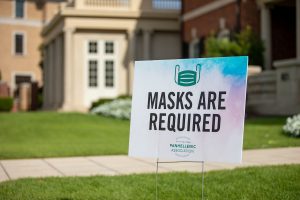 It’s sweltering outside, but taking masks off is not an option during the pandemic.
It’s sweltering outside, but taking masks off is not an option during the pandemic.
So what can be done to help?
Dr. Thomas Weida, the chief medical officer for the University Medical Center and associate dean for clinical affairs in the college of community health sciences at The University of Alabama, has some tips to help people gain some relief.
“No. 1, masks are essential for preventing the spread of coronavirus, bottom line,” he said. “Your masks protect the people you’re with and their masks protect you.
Breathing through a mask can be slightly more difficult than not wearing one, but a mask needs to be effective, Weida said.
“If you can shine a light through it it’s not that effective,” he said. “Make the compromise of perhaps walking a little slower across campus so you don’t breath more laboriously.”
Weida said people should try to use masks that leave some space between their nose and the mask so they don’t stick to their faces, provide more breathing room and offer more comfort.
Another way to keep a bit cooler is wearing masks that are lightly colored because black masks absorb heat, he said.
Besides the fit and color of the masks, the type of mask worn also has an impact on how easy it is to breath, the humidity around the nose and mouth and effectiveness.
“Recently, there’s been a lot of discussion of types of masks,” Weida said. “Fleece masks or gators are actually not that effective. Obviously your most effective masks are N95s, surgical masks and cloth masks, in that order. Bandanas, though more cool, are not that effective.”
Also, wet masks are less effective, he said. So try to keep from sweating on them or them getting wet in the rain.
“Hey, a big umbrella can keep your masks dry and help you social distance,” Weida said.
Outside of the mask itself, other ways to stay cooler are taking the typical heat precautions such as staying hydrated, sticking to shady areas, taking rest breaks and wearing loose clothing.
“If you’re outside doing a lot of exertion, you can overheat quicker with a mask on so pay close attention to what you’re doing,” Weida said. “If you start to get thirsty your body is telling you that it’s getting dehydrated you may want to get out of the heat and get some water.”
Weida recommends staying better hydrated during physical exertion than if not wearing a mask, perhaps drinking a cup of water every 20 minutes.
“It’s all about paying closer attention to your body and what’s going on,” he said. “People just need to be smart and try to minimize the transmission of coronavirus. That’s how we beat this thing.”
